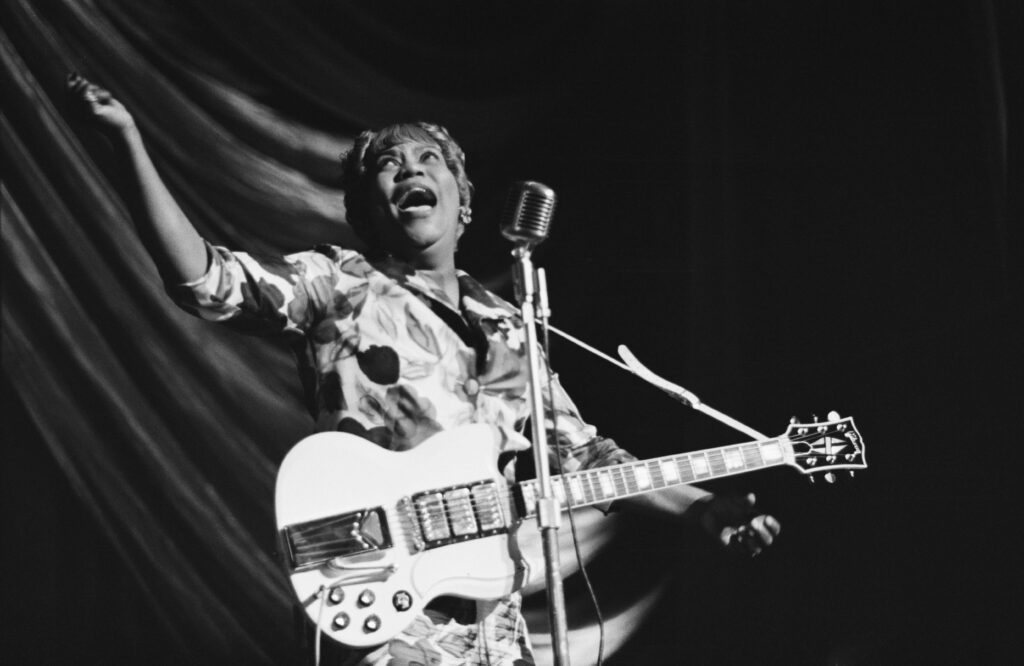
Sister Rosetta Tharpe was a hit from the start. She was a musical prodigy who played guitar to church crowds at 6 years old. By 20, she performed in New York’s famous Cotton Club, and by 1938 she signed a record deal with Decca that produced hit after hit. She pre-dated Elvis who was fascinated with her electric guitar picking style. She inspired Chuck Berry, the Father of Rock n Roll, who once said his entire career was “one long Sister Rosetta Tharpe impersonation.” Eric Clapton, Johnny Cash, and Aretha Franklin were all influenced by her, too. Then why don’t we know who she is?
[My] entire career was one long Sister Rosetta Tharpe impersonation.
–Chuck Berry, Father of Rock and Roll
How To
“You truly want to know what to do or how to do it, or maybe the best way…talk to Black women. Unlike everybody else, Black women can’t afford to f*** around and find out,” said Trevor Noah on the Daily Show. In early half of the 20th century, white society wasn’t asking African American women anything. They were clearly separate in almost every way, even musically. When the billboard charts created a top 100, they also created a category for African Americans the “race charts”. This category went through a variety of changes and is now known as R&B/Hip Hop.
You truly want to know what to do or how to do it, or maybe the best way or the most equitable, talk to Black women. Unlike everybody else, Black women can’t afford to f*** around and find out.
– Trevor Noah, Daily Show, Dec 8, 2022
Enter Rosetta Tharpe. She wasn’t waiting for anyone to ask her how to do it. She exploded on the scene telling others how it was done. In a time where women did not play guitar, and definitely didn’t play electric guitar, she wowed and horrified church crowds everywhere. The African American churches were a hub of top notch musicians that performed during special concerts each week. That’s where Tharpe got her start. Her first hit, Rock Me, was directly from the church and born of African American culture.
As she catapulted to fame, things changed for Rosetta. She performed for different audiences and began singing secular music. When she teamed up with Lucky Millinder on tour, the way she growled the lyric Rock Me sexualized the song some complained.
Then, she did something that caused her religious fans to swoon. She sang a secular song called I Want a Tall Skinny Papa.
I want a tall skinny papa
-Tharpe
I want a tall skinny papa
I want a tall skinny papa
that’s all I’ll ever need
In today’s times, it’s hard to imagine the outrage about such lyrics, but at the time, it was a big leap from religious to secular music. Her religious fans were outraged, but they still loved her.
There are Strange Things Happening Every Day
Even with Tharpe’s immense talent and popularity across racial lines, the Jim Crow system stilled worked against her. In the segregated South, African Americans were not allowed in “white” restaurants or hotels (among other places). They weren’t even allowed in “Sundown” towns at night. Sometimes, her white musician companions would go to restaurants and order food to go so Tharpe and her crew could eat. The Negro Motorist Green Book was printed to help African American travelers locate businesses, restaurants, and hotels that served them. The aim was provide safe travel for African Americans through the South, particularly in Alabama and Mississippi.
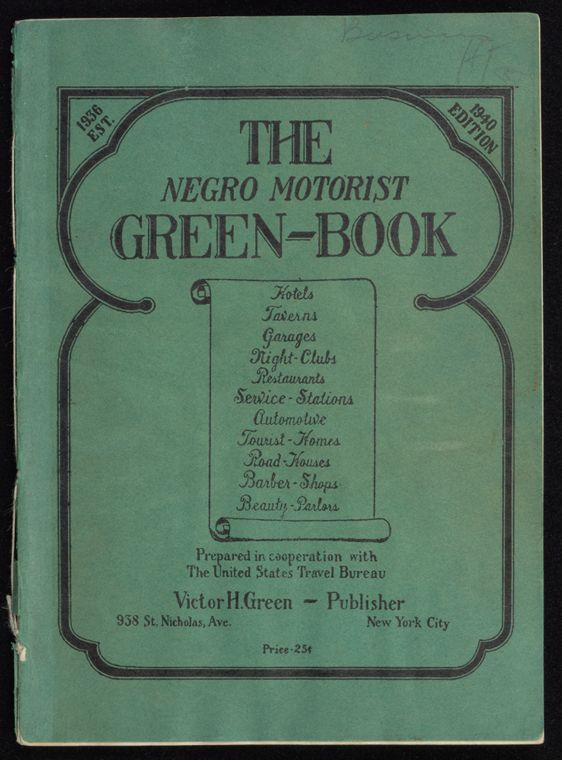
Despite her money and fame, Tharpe was not immune to the African American struggle. In the 1940s, Tharpe was arrested in a Richmond, Virginia department store, Thalhimers, for shopping in an all-white store and attempting to buy a fur coat with cash. Later, she outfitted a bus with sleeping quarters in the back. It was one of the first musician tour busses. It served a practical purpose as well. Tharpe and those who traveled with her were always able to eat and sleep in any southern town.
Tharpe’s music gently reflected the times. One of Tharpe’s biggest hits, There are Strange Things Happening Every Day, is a traditional African American spiritual. It spoke at the time about good and evil and was aimed at the hypocrisy of segregation.
While the song may have been learned in African American churches, the message was clear. Tharpe had created something new– the beginnings of rock and roll.
She traveled with many bands and artists throughout the 1940s. She toured with an all white group named the Jordanaires.
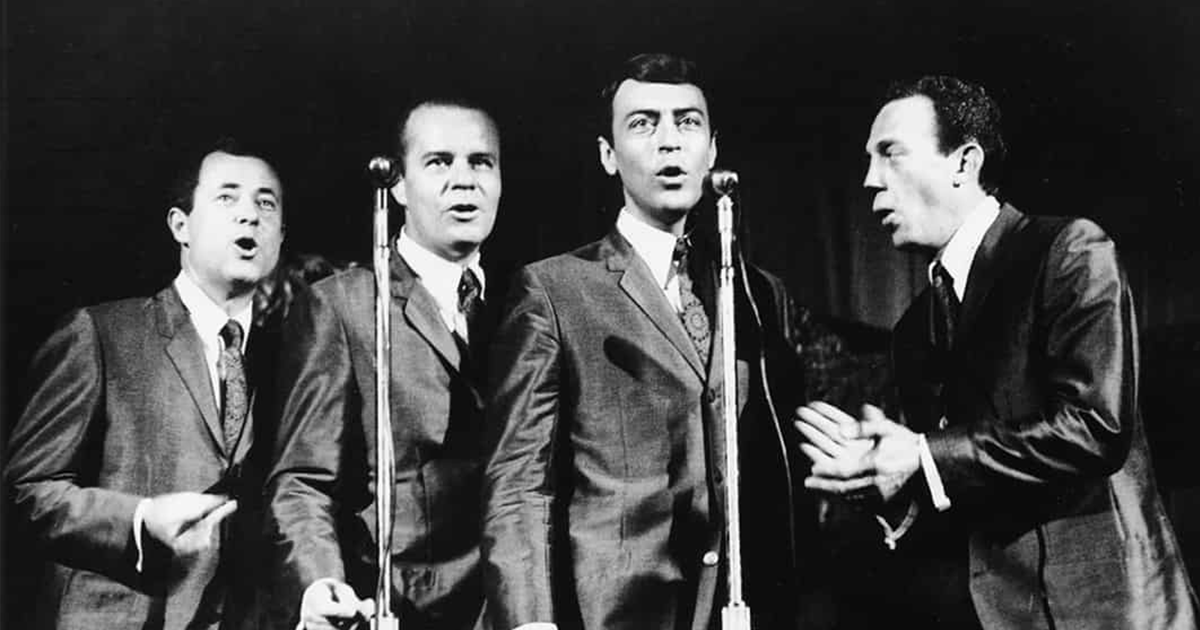
Then, she met Marie Knight who became her partner.
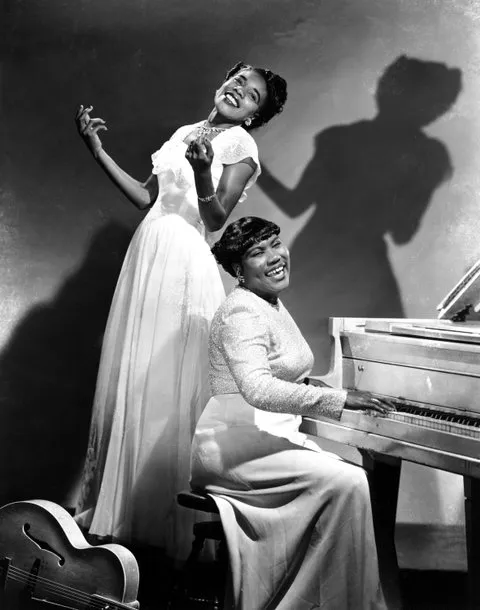
The two of them, as women and only women, headlined shows throughout the country. It was extremely unusual during that time for women to perform without men. Crowds adored them. Unfortunately, Marie Knight’s mother and children were killed in a house fire and she was unable to continue on tour. As Knight disappeared, Rosetta Tharpe’s career faded to darkness.
Several white singers swooped in to steal her style. Tharpe was prohibited from white radio and the music charts. The system was set up against her and all minorities. At that time, Nat King Cole had tried to host a television show, but no national sponsors would support him because they were afraid of southern boycotts. Chuck Berry, who is considered the Father of Rock and Roll once said that his entire career was just a Rosetta Tharpe imitation. Initially, this may sound like a compliment, but it’s not. He stole her style, even her duck walk. Elvis, who had seen her perform at a church in Nashville, Berry, Jerry Lee Lewis, and others appropriated her work and cashed in without a second thought given to the one who created it. They even re-recorded some of her songs. When they took over the charts, Rosetta was left in the dust.
The Wedding Singer
As her career waned, Tharpe and a promoter came up with an idea. What do 20,000 people, second base, and all have in common? They were all in attendance at Tharpe’s third, and final, wedding in July 1951. A year earlier, Tharpe and promoters came up with an idea to relaunch her stalled career. They would invite the public to the Griffith Stadium, the African American baseball venue in Washington, D.C. Afterwards, she would perform a concert and Decca records would have exclusive rights. to the recording. The only problem was…they didn’t yet have a groom.
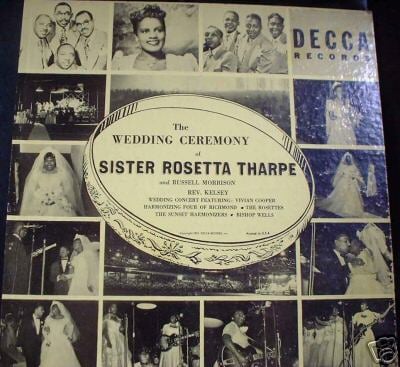
Weeks before the nuptials, Tharpe found someone to marry.
The wedding was immensely popular. Over 20,000 fans crowded into the stadium paying .95-$2.50 a ticket. Fans brought gifts, dishes, and even a TV for the blushing bride. Over second base they built an altar/stage with an aisle in place from the pitcher’s mound. The department store in Virginia where Tharpe had been arrested brought her wedding gown and a white woman to fit the dress before the ceremony. Media outlets took pictures and reported on the day’s activities including the LA Times and Ebony. The only disruption to the ceremony came with the 3-year old ring bearer got ahead of everyone in the wedding party, including the bride, and had to be escorted back to the pitcher’s mound. The couple stayed married until her death.
Didn’t It Rain
As other performers took over the rock and roll scene, there wasn’t a place for Tharpe in the United States. In the early 1960s, she and other African American performers found some success in Europe. Crowds flocked to see her.
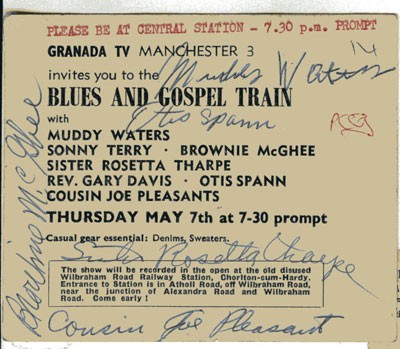
Rosetta Tharpe’s flamboyant personality and amazing electric guitar skills won her many fans overseas. During one tour, Tharpe performed in Manchester at an unused train station. The audience sat on one side of the tracks. She pulled up on horse drawn wagon in the pouring rain. As she walked to her side of the tracks to perform she remarked how wonderful it was that the audience had stayed to see her perform despite the weather. And perform she did.
Didn’t it Raaaaaain?!!! She belted out after she strapped her electric guitar around her shoulder. The performance highlighted all her talent: voice, electric guitar, and showmanship. In attendance were some who would be influenced by her music as they themselves became stars in the years to come: Eric Clapton, Jeff Beck, Keith Richards and Brian Jones. All acknowledge being impacted by Rosetta’s music.
I said it raaaained children!!
Rosetta never did recover her popularity in the United States. In 1970, Tharpe had a stroke and her leg was amputated. Diabetes took a toll on her body. The night before she was to return to the studio to record a new album, she died as a result of a second stroke.
I’m All Shook Up
Even in their deaths the treatment of Tharpe versus the white men who culturally appropriated her style was vastly different. When this stamp was produced by the USPS in 1998, no one would have even known where to look for Rosetta Tharpe. Until 2009, she remained in an unmarked grave. Uncelebrated and in obscurity.
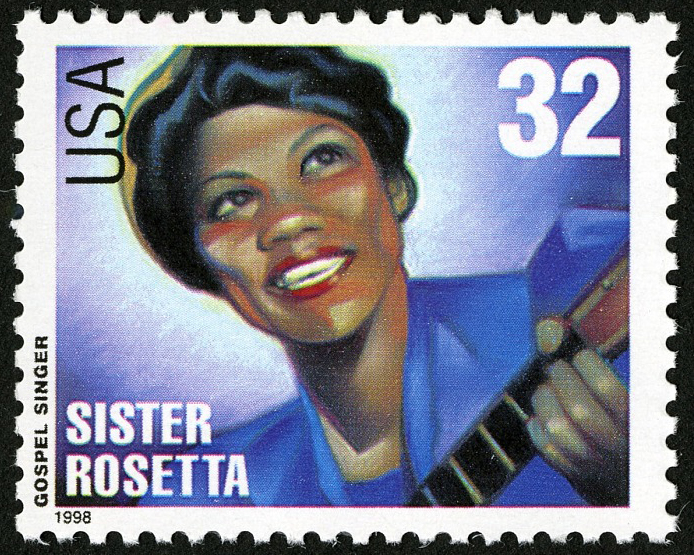
Chances are even if you can’t swing the $79.75* per person tour, if you’ve ever been to Memphis you’ve likely driven by Graceland–a shrine to Elvis visited by thousands every year.
*ultimate tour is $215 per person!!! (with lunch, of course)

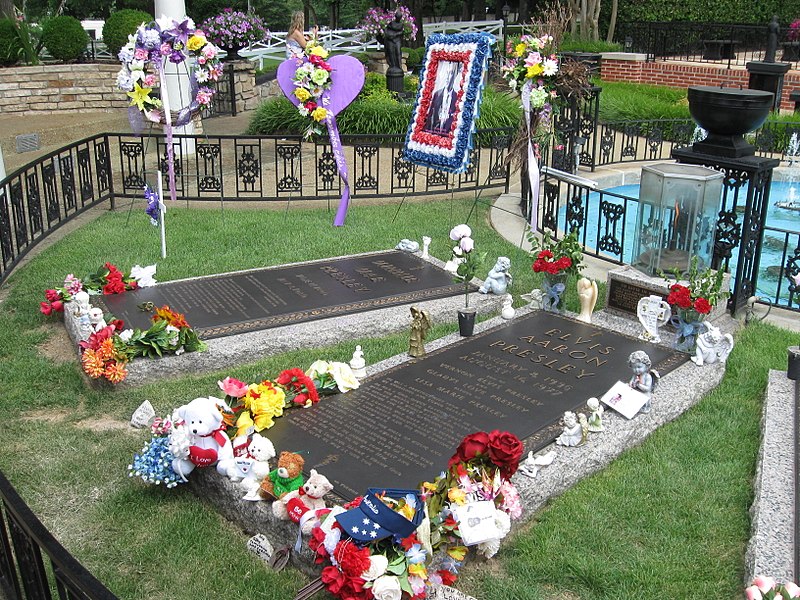
Nearly every major music star (white, male) from that time period are celebrated and adorned even in death.
She was all but erased.
That’s All
Say, man, there’s a woman that can sing some rock and roll. I mean, she’s singing religious music, but she’s singing rock and roll
Jerry Lee Lewis (Inducted Hall of Fame, 1986)
It took until 2018 to get it right. Long overdue, Rosetta Tharpe was finally inducted into the Rock and Roll Hall of Fame celebrating the contributions she was made to the genre. The Mother of rock and roll was finally home.
Works Cited
"Billboard Magazine Used to Refer to R&B Songs as 'Race Records.'" blackhistory, Dante Lee
International, www.blackhistory.com/2020/02/billboard-magazine-rb-songs-race-records.html.
Accessed 18 Jan. 2023.
Examined the history of the Billboard music charts. There were segregated charts for
African Americans.
"A Black Woman Pioneered Rock and Roll: Sister Rosetta Tharpe and the Retrieval of Her Legacy."
Medium, 24 Feb. 2021, medium.com/age-of-awareness/
a-black-woman-pioneered-rock-and-roll-sister-rosetta-tharpe-and-the-retrieval-of-her-legacy-faa7f5ec5
7f2. Accessed 18 Jan. 2023.
Background knowledge, primary documents including newspaper articles and photographs.
TeAnna Atkins is a relative of Rosetta Tharpe and currently lives in Milwaukee, WI.
DuBrow, Rick. "TV in the '50s a Forgettable Period for Blacks." LATimes, Los Angeles Times, 29 Feb.
1992, www.latimes.com/archives/la-xpm-1992-02-29-ca-2627-story.html. Accessed 18 Jan. 2023.
Nat King Cole's struggle to remain on the air as the nation's first African American TV
host. No national advertisers would sponsor him due to fears of southern boycotts.
Hackel, Stu. "Sister Rosetta Tharpe: The Godmother Of Rock'N'Roll." U Discover Music, uDiscover
Musica, 20 Mar. 2022, www.udiscovermusic.com/stories/sister-rosetta-tharpe-rocknroll-pioneer/.
Accessed 3 Jan. 2023.
Used for background information about Sister Rosetta Tharpe including information about
influencing Chuck Berry and Keith Richards.
Long, Chris. "Muddy Waters and Sister Rosetta Tharpe's 'mind-blowing' station show." BBC, 7 May
2014, www.bbc.com/news/uk-england-manchester-27256401. Accessed 18 Jan. 2023.
Documenting that a minibus came from London with Eric Clapton, Jeff Beck, Keith Richards
and Brian Jones to see Rosetta Tharpe at the Manchester show on May 7, 1964.
New York Public Library Digital Collection. New York Public Library Digital Collections,
digitalcollections.nypl.org/collections/the-green-book#/?tab=navigation. Accessed 18 Jan. 2023.
Used for "Negro Motorist Green Book" images. Green Book, invented by Victor Green, helped
African Americans travel safely through the Jim Crow south by highlighting businesses,
restaurants, and hotels that safely served African Americans.
NPR. 25 Sept. 2019, www.npr.org/2019/09/25/763742547/
the-most-elaborate-wedding-ever-staged-rosetta-tharpe-at-griffith-stadium.
Wedding of Sister Rosetta in front of 20,000 people followed by concert.
NPR. 24 Aug. 2017, www.npr.org/2017/08/24/544226085/
forebears-sister-rosetta-tharpe-the-godmother-of-rock-n-roll.
Used for general background information about Sister Rosetta Tharpe. Also used to learn
about different bands she toured with and people she married and dated.
PBS. WNet, 28 Dec. 2012, www.pbs.org/wnet/americanmasters/
timeline-the-years-of-sister-rosetta-tharpe/2487/.
Timeline of Rosetta Tharpe's marriages, break throughs, and music career.
Popsike. www.popsike.com/RARE-78-RPM-Wedding-Ceremony-of-Sister-Rosetta-Tharpe/4785474925.html.
Picture of wedding recording saved as sisterrosettaweddingrecord.jpg
Rockhall. Rock and Roll Hall of Fame, www.rockhall.com/inductees/sister-rosetta-tharpe.
Used for Hall of Fame induction video by
"Rosetta Tharpe - Guitar Solos in Motion Picture." YouTube, uploaded by Rosetta Tharpe, youtu.be/
gELe5Rj_tXU.
Compilation of guitar solos. Amazing!
"Sister Rosetta Tharpe- 'Didn't It Rain?' Live 1964 (Reelin' In The Years Archive)." YouTube,
uploaded by ReelinIntheYears66, youtu.be/Y9a49oFalZE.
Used for live version of "Didn't it Rain" in 1964.
"Sister Rosetta Tharpe That's All." YouTube, uploaded by Flash Back Musicas, youtu.be/WoZoilbA48w.
Accessed 2 Jan. 2023.
"Sister Rosetta Tharpe - Up Above My Head on Gospel Time TV show." YouTube, uploaded by Robo_Ant,
youtu.be/JeaBNAXfHfQ?t=83.
Up Above My Head guitar solo. Simply amazing.
"Sister Rosetta Tharpe With Otis Spann - This Train (Live France 1964)." YouTube, uploaded by Bob
Juke, youtu.be/LoarRnTfEFY.
Used for video link in article. Live performance from France in 1964. This Train.
"That's All - Sister Rosetta Tharpe and Albert Ammons - Live 1938." YouTube, uploaded by Nancy
Canson, youtu.be/kcpgTzDpW-Q.
Used for live Carnegie Hall performance in 1938. It certainly sounds like rock n roll.
Widner, Ellis. "Arkansas gospel upstart Tharpe gets a Philadelphia shout-out." Arkansas Online,
Arkansas Democrat Gazette, 15 Jan. 2008, www.arkansasonline.com/news/2008/jan/15/
arkansas-gospel-upstart-tharpe-gets-phila-20080115/. Accessed 18 Jan. 2023.
A benefit concert provided funds necessary to get Rosetta Tharpe a proper grave stone.
Philadelphia also created Rosetta Tharpe day.

